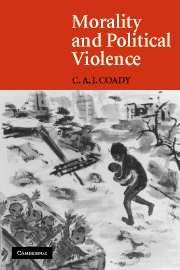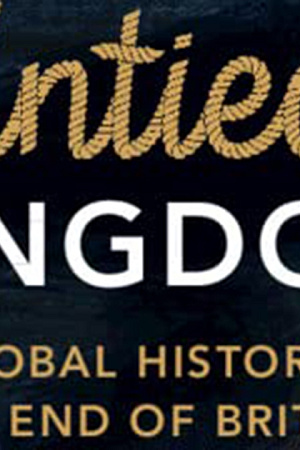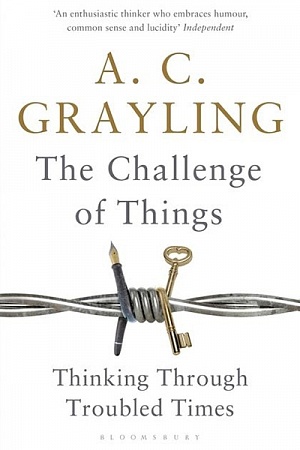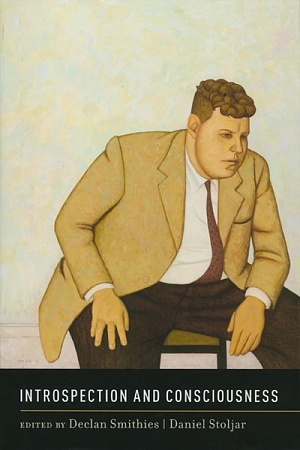Morality and Political Violence
CUP, $47.95 pb, 317 pp
What a deluge of miseries
War, on a sudden, and at one stroke, overwhelms, extinguishes, abolishes, whatever is cheerful, whatever is happy and beautiful, and pours a foul torrent of disasters on the life of mortals – no sooner does the storm of war begin to lower, than what a deluge of miseries and misfortune seizes, inundates, and overwhelms all things within the sphere of its action! The flock are scattered, the harvest trampled, the husband-man butchered, villas and villages burnt – cities and states, that have been ages rising to their flourishing state, subverted by the fury of one tempest, the storm of war. So much easier is the task of doing harm than of doing good; of destroying than of building!
These words from Erasmus sum up what C.A.J. Coady, professor of philosophy at the University of Melbourne, calls the moral scandal of war. Erasmus was clearly not on the bedside table of George W. Bush when he launched his war on Iraq, a war which some have argued was waged with the intent of doing good (an argument to which Coady gives little credit), but one which has shown again how much easier it is to do harm. Michael Walzer’s aphorism ‘War kills: that is all it does’ is also used to highlight the moral scandal of war. Coady takes Walzer’s point but, like Erasmus, wants to make us see that war in fact does a lot more than kill: ‘it also maims, distorts, and injures in many complex, enduring ways. It transforms people, both warriors and those caught up in the violence, and radically alters the normal conditions of their existence.’
Can such violence be morally justified? What manner of thinking should we use in considering whether to resort to war? If it is true that the primary effect of war is killing and destruction, is there any scope at all for the discussion of what Coady calls ‘altruistic wars’? These are wars waged with the intention of doing good and preventing or ending a harm that is manifest.
Coady wants to pursue the moral issues raised by these questions at a yet more fundamental level. Built into many of the standard debates about these questions is the view that the moral legitimacy of war (such as it is) has in part to do with the formal structures of the international state system. On this view, we are not discussing political violence, but state sanctioned force: the former is dismissed as out of bounds, the latter is legitimised because of the formal structures of the relationships between states. Coady takes this to be a specious distinction. He says, ‘Given the appalling record of states in the unjustified employment of lethal force to devastate populations, economies, and cultures over the centuries, I am unimpressed by any attempt to put a conceptual or moral gulf between the resort to state force … for political purposes by state agencies and its political employment by nonstate actors.’ He sees no justification for ‘smuggl[ing] into the terms of our discussion some bias in favour of states when they employ morally contestable means’.
Coady’s ambition, then, is to set out a framework for the evaluation of political violence which can encompass all forms of violence employed for political purposes. All manner of agents are included, be they states, individuals, terror cells, international government organisations, non-government organisations or corporations. Similarly, all forms of violence are included. War, certainly; but also interventions, terrorist acts, armed revolutions, violent demonstrations, the activities of mercenaries and private corporations, and so on.
Coady argues that the appropriate general moral framework for evaluating all cases of political violence is that known as the Just War Tradition, which he views as a broadly non-consequentialist moral theory underpinned by an ecumenical common-sense morality. The Just War Tradition poses various ethical tests for the conduct of war, known as jus ad bellum, jus in bello and, more recently, jus post bellum: that is, the justification of going to war, the justification of the conduct of war, and the justification of postwar policy and behaviour. Various parts of the book are taken up with the explication of these ethical considerations, and their application to all the categories of political violence which Coady treats, notwithstanding the tradition’s own focus on war.
Coady’s discussion of the Just War Tradition is broad and wide-ranging, and is clearly informed by prodigious scholarship. Quite often his arguments are in response to positions taken by the important contemporary exponent of the tradition, Michael Walzer. On most of these occasions, Coady is contesting Walzer’s position. For example, Coady engages with Walzer’s theory of a state’s right to defend itself against aggression. Coady says Walzer’s theory is both too strong and too weak, and, in addition, is insensitive to human rights. It is too strong, in that Walzer too readily licenses a victim of aggression (a state) to embark on war. It is too weak because restricting the legitimacy of a just war to the case where one state is responding to aggression from another leaves any number of other evils in the international order untouched. Overall, his theory seems to sanction the contemporary arrangements of international society, rather than challenging them on human rights grounds (see chapter four).
Another example is Coady’s critique of Walzer’s position on who should bear responsibility for the decision to go to war. Walzer’s view is that responsibility lies with the ruler alone, not with citizens or soldiers. He quotes Shakespeare’s Henry V approvingly: ‘we know enough if we know that we are the king’s subjects. If his cause be wrong, our obedience to the king wipes the crime of it out of us.’ Coady will have none of this: ‘Walzer’s invocation of a moral outlook on political obligation perhaps appropriate to the relations between a fifteenth-century absolute monarch and his subjects as a model for contemporary democratic political theory is simply astonishing …’ Walzer, though perhaps the pre-eminent, is only one of many theorists with whom Coady engages. My regret here is that this engagement is not presented systematically; a fuller treatment may have helped the cohesiveness of the book.
This is a significant consideration, because the book is long and rich, and treats many aspects of the question of political violence: aggression, violence, terrorism, weapons of mass destruction, the immunities of combatants, mercenaries, conscientious objection, the romance of war, the psychology of warriors and so on. These accounts are contained within fourteen chapters. Many of these chapters have been published before in part or full, and this helps to explain the occasional lack of cohesiveness and the variability in tone.
At times the reader is exposed to unnecessarily arcane arguments. For example, in chapter two, the idea of violence is analysed closely; but most of this chapter is spent dismissing views which Coady has little time for himself: for example, the views of Johan Galtung, which he suggests are ‘either muddled or mischievous (and just possibly both)’. Why they need to be rehashed is unclear; far better to use the space for Coady’s own, unmuddled, ideas.
The book could have been better organised to ensure that readers do not become confused about the complex ideas that Coady discusses. There is no general introduction to the book: the reader is launched into the deep end. The last chapter, which also engages with Walzer, has much of note to say, but ends rather abruptly and may leave the reader wishing for a bold and decisive restatement of the main themes and arguments of the book. These points matter all the more because of Coady’s stated hope that the book will aid ‘interested nonspecialists’.
Coady says, towards the end, ‘Two things are important in doing moral philosophy: one is intellectual openness to a range of views, including confronting ones, and another is an awareness that intellectual exercises in this area can have profound implications for life.’ This book is a fine demonstration of how one must be open to and engaged with a range of views, even when at odds with them.
Similarly, Coady’s moral seriousness is exemplary. Political ideas have enormous consequences for people’s lives; ideas about the political use of violence have consequences which are truly stark. Coady has done a fine service to the reading public by making available his reflections on these questions for our own consideration and judgement.











Leave a comment
If you are an ABR subscriber, you will need to sign in to post a comment.
If you have forgotten your sign in details, or if you receive an error message when trying to submit your comment, please email your comment (and the name of the article to which it relates) to ABR Comments. We will review your comment and, subject to approval, we will post it under your name.
Please note that all comments must be approved by ABR and comply with our Terms & Conditions.